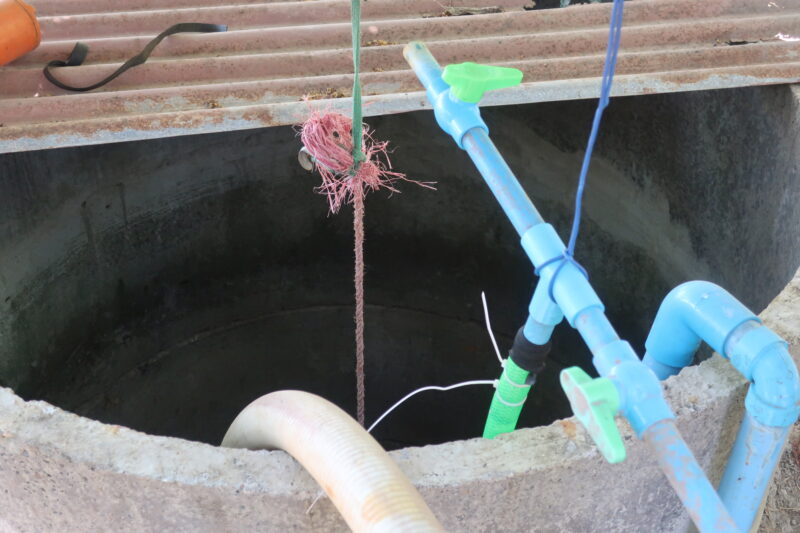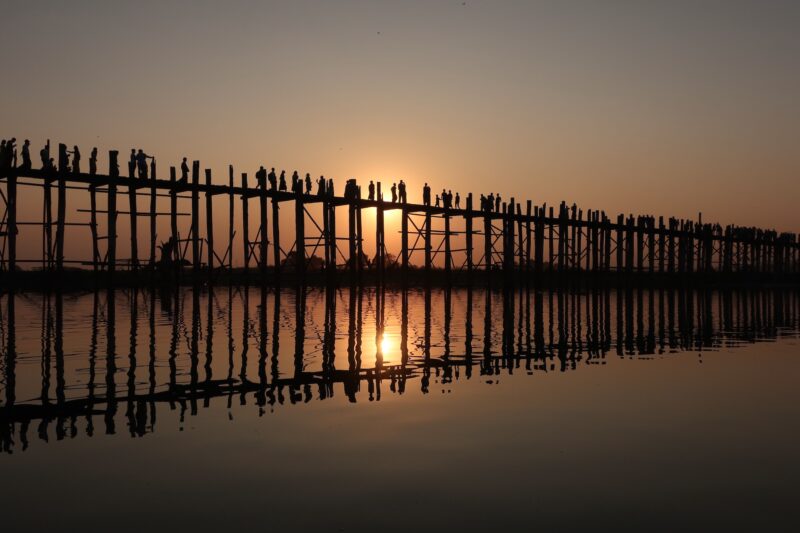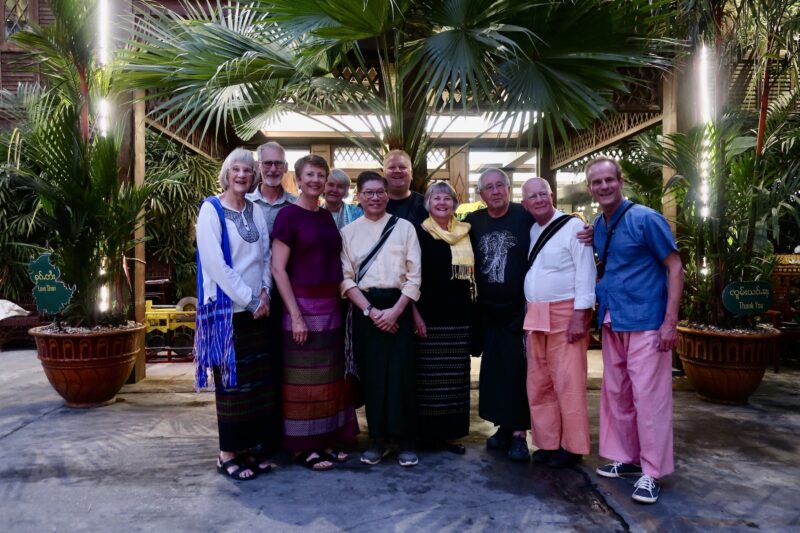ABM Archive Website
THIS WEBSITE CONTAINS ARCHIVE MATERIALS FOR HISTORICAL REFERENCE ONLY
For up-to-date information, including our latest appeals, news, and resources, please visit our current website.
Tony Naake’s Myanmar Water Challenge, April 2020
Mingalabar!

Tony Naake on his recent trip to Myanmar at the Shwedagon Pagoda. © Paul Lee, 2020.
My interest started on the second pilgrimage in 2017 when we visited Mya Goe Gyi, a remote village in the Aerwaddy delta, a major rice growing area. The area is surrounded by water but is unusable due to severe contamination and pollution which is mainly due to fertiliser run off, factory waste, all sorts of human waste and garbage that gets discharged into the river.
As a result they use copious amounts of plastic bottled water and the women have to walk miles to surrounding villages every day to collect clean drinking water. Since that first visit, my passion grew to make a small contribution to this wonderful country.
In April 2019 my Myanmar Water Challenge was launched to supply clean drinking water to these remote villages. My original target was to raise $30,000 but my good friends at ABM supplied me with promotional material to raise $50,000! How could I refuse?
So here I am in February 2020 back in Yangon the capital city of Myanmar which is renowned for its colonial heritage buildings. Every trip to Yangon has to include a visit to the gilded Shwedagon Pagoda. This time we visited at night, witnessing large crowds of people of all ages paying their respects to Buddha.
The first two days of the pilgrimage was spent with the Myanmar Provincial Development Desk staff and meeting the Men’s Group and the Mother’s Union who shared progress on their projects.
I could hardly wait for our bus trip to Yaytarley Village to witness the vibrant community where villagers are now enjoying the benefits of ABM’s partnership with improved water sanitation, waste management and livestock grazing practices. Prior to ABM’s involvement in the village, there was no clean drinking water, very little sanitation and no toilets. Bringing clean drinking water to a remote village in Myanmar is my passion, something we all take for granted in Australia! ABM’s project was to construct three tube wells and at least 20 latrines with septic tanks in the village. The best thing is that after the three tube wells were constructed and in operation, the villagers used the technology and know how to construct a further eight tube wells for the village. The water is piped from the well by generator into a holding tank to let the water settle as the quality is not good enough to drink. After 3 days the water is tapped to another smaller tank for use and the holding tank is cleaned. To drink this water it has to be filtered or boiled.
 A holding tank and two water outlets at Yaytarley village. © Tony Naake, 2020.
A holding tank and two water outlets at Yaytarley village. © Tony Naake, 2020.
 Latrines and septic tanks promotes good hygiene at Yaytarley Village. © Tony Naake, 2020.
Latrines and septic tanks promotes good hygiene at Yaytarley Village. © Tony Naake, 2020.
Saying “Mingalabar” to the villagers was a teary experience – we have so much and they have so little. However, we might think they don’t have very much but as an agricultural country who produce rice as their major export, they seem happy and content with what they have.
Back on the road again to Taungoo, on the way we visit the Men’s Association organic farming program at Hlegu. ABM partners in several projects here in purchasing the land and building accommodation and a work area for the four farm workers. The use of fertiliser is not good for the land or the produce. Run off into the water systems creates contamination, hence the practice of making natural compost with a special brown liquid which can be achieved in just two weeks! Breeding pigs, selling them at the market and rice farming are now slowly producing an income. I drank water straight from the new tube well in Hlegu and can report no after effects! The plan is to invite farmers and students to learn about animal husbandry and organic farming. As electricity is about 2 miles from the farm, one of the students who is also an electrician has constructed a windmill and a solar panel to supply the buildings with electricity – he is very innovative!

Clean “Ready to drink Water” from the tube well at Hlegu. © Tony Naake, 2020.
In Taungoo we were present for the opening of the lecturers accommodation at St. Peter’s Bible school which ABM has contributed to. We were inspired by a visit to the early childhood centre Agape 2 which ABM first supported in 2010 and was self sufficient in 2015 and we were privileged to visit there in 2017. The project was then extended to Agape 1 next to the bishops house which we were thrilled to visit on this latest trip.
In 2020, ABM aims to supply clean drinking water to a total of 2,750 people in 8 villages. Seminars will also be conducted to cover important topics such as hygiene and sanitation, environmental awareness, safe agricultural practices and women’s empowerment.
Training workshops, typically conducted in the local church, cost $60 to train 20 people in 4 different topics: personal hygiene and sanitation, gender and environmental awareness, and agriculture. $100 buys 2 basic fly-proof latrines. $500 funds the fee of a professional water technician. Construction of a tube well, which provides water for up to 225 people, costs $2,750. So much can be achieved with people’s generous support!
One very important factor to me regarding ABM’s work in Myanmar is that the benefits go to everyone – any religion and even the non-believers! A small donation from Australia goes a long way to villages. They are very resourceful people who work hard and nothing much goes to waste.
As well as witnessing the great work of ABM we had some time off sightseeing at Inle lake, a significant world biosphere site, as well as watching gold leaf making at Mandalay, and a day trip on the Aerwaddy river to Bagan including hot air ballooning over the ancient temples.
 Sunset at the longest teak bridge in the world at Mandalay. © Tony Naake, 2020.
Sunset at the longest teak bridge in the world at Mandalay. © Tony Naake, 2020.
 All dressed in traditional costume for a farewell dinner with the staff at Yangon. © Church in the Province of Myanmar, 2020.
All dressed in traditional costume for a farewell dinner with the staff at Yangon. © Church in the Province of Myanmar, 2020.


